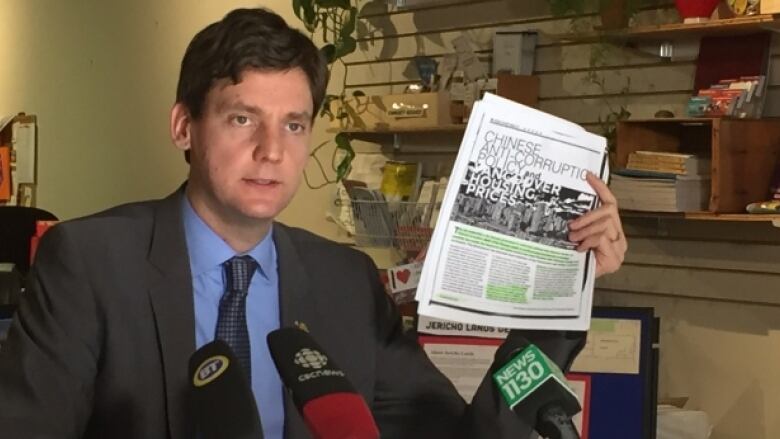NDP housing critic pleased feds closing real estate loopholes
Federal move an important shift in direction to help people who live and work here buy homes, says David Eby

NDP housing criticDavid Eby is happy the federal government has decided to collect information to monitor how Canadianreal estate markets, including Metro Vancouver's, can be used and abused by people who want to avoid capital gains taxes.
"It's a good news day that the federal government is heading in the right direction," said Eby.
"It looks like the government is going to begin collecting the information we need to understand how people might be using our real estate market as an investment instead of as a place to live."
There are a couple of initiatives in Ottawa'sannouncement of new rules to curb foreign real estate investmentthat are of particular interest to Eby.
"I'm grateful they ignored both the premier and the advanced education minister who said there was nothing to see here," said Eby.
"The changes they madeI'm particularly excited about relate to requiring that when you sell a home you have to report the proceeds from that to the Canada Revenue Agency," said Eby.
According to Eby, that reporting is critical for a couple of reasons.
"One is if someone is continually buying and flipping houses in our real estate market, they may no longer be able to claim a capital gain, because it is not a principle residence anymore. It's actually a business that they're running."
"And, the second reason is we need better data about what's happening in our real estate market, and it's only by collecting this information that we can know whether a family is purchasing multiple properties under the names of different family members in order to run an investment style scheme, instead of using the principle residence exemption as it was intended," said Eby.
Thankful province ignored
Eby thankedthe federal government for ignoringthe B.C. government's skepticism that something untoward has beengoing on in the local real estate market.
"We saw the premier say that she was skeptical about $57 millionworth of properties bought by students on the West Sideof Vancouver. We saw the advanced education minister come out and say that it was a witch-hunt," said Eby.
It's time, he said, for the housing market to stop being an investment tool and instead provide homes for people who live and work here.
Despite the federal government's announcement,Eby remains nervous it'llhave the resources to aggressively enforce the rules.
B.C.'s minister responsible for housing issued a written statement following the federal announcement.
"The changes announced by the federal government include measures we have asked for and, they are welcome steps that may help provide further fairness and stability in the market for homebuyers," said Rich Coleman.
"We hope this also reflects an increasingly strong focus by the federal government on the issue of housing affordability, both market and rental housing, across the country and, is a signal that we will soon hear more about the funding the federal government will contribute to construct more new homes through a national housing strategy."
Baby steps
Other real estate watchers were also quick to weigh in on the federal government's announcement.
"It'll tighten the loophole, but it won't close it," said Vancouver real estate lawyer Kenneth Pazder.
Notaries public require peopleto confirm they are Canadian residents when they sell a house.
If people are prepared to be dishonest, Pazder saidthe federal government's system won't work.
"The government took a baby step on the issue of affluent buyers who pay low property and capital gains taxes," saidUBC real estate professor Tom Davidoff.
"When you buy a property now, you're either going to owe a capital gains tax at the end or have to declare your global income for tax purposes throughout your stay in the home."
Davidoff said it doesn't get around the problem of students or stay-at-home spousesbuying a property with money coming from a relative or friend overseas.
"If they've got a low income tax rate, Canada's still not going to see much revenue out of that."












_(720p).jpg)


 OFFICIAL HD MUSIC VIDEO.jpg)
.jpg)



























































































